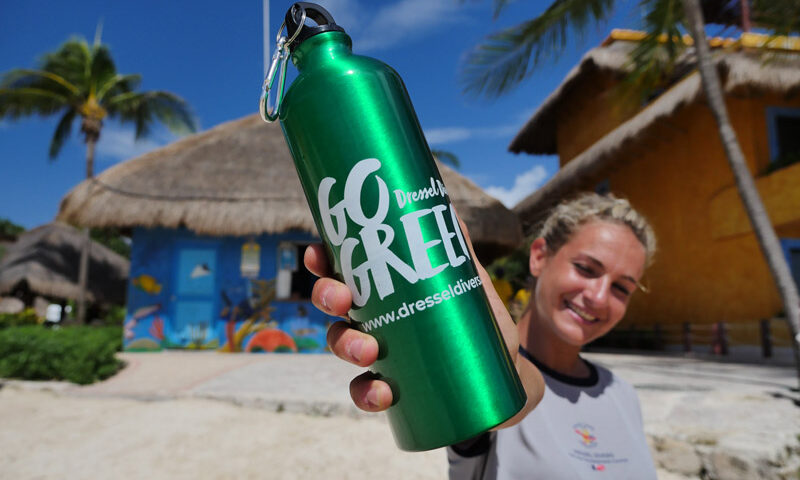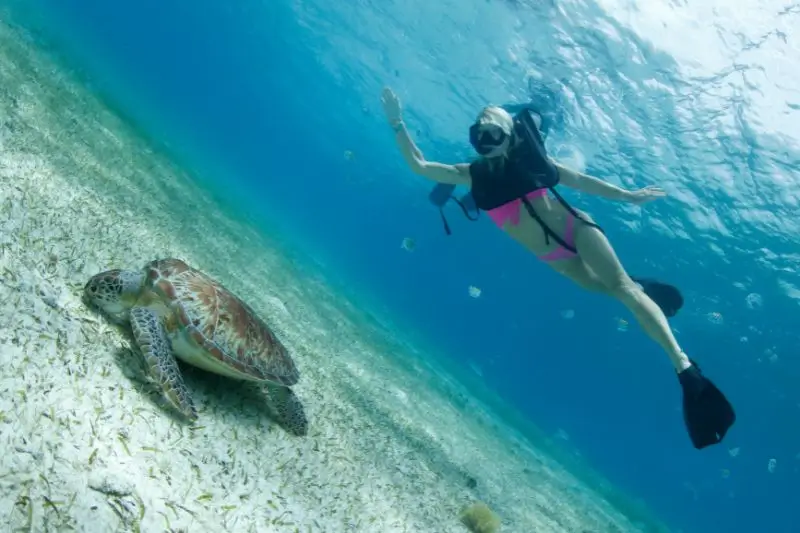From regulating body temperature to enhancing cardiovascular efficiency, hydration while diving plays a crucial role in optimal performance underwater. In this article, we delve into the significance of maintaining proper hydration during dives and the unique challenges that divers face in preserving this vital balance.

SCHOOL OF FISH | Names For The Different School Of Fish
27/10/2021
Unlimited Diving in The Caribbean Sea; 4 Locations to Practice It
09/11/2021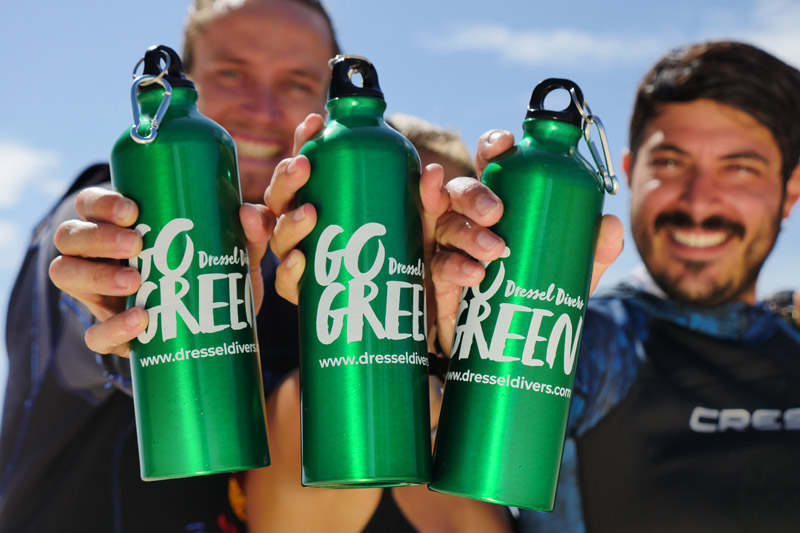
1. Why Maintaining Proper Hydration While Diving Is Vital?
In the world of diving, staying hydrated is not just a helpful tip, but a critical factor in preventing health complications during dives. With 60% of our body made up of water, its importance for the optimal functioning of the human systems is undeniable. From regulating temperature to lubricating joints and flushing out waste, water and its minerals act as fundamental pillars for physiological balance in every cell and tissue of the body.
In the fascinating realm of hydration while diving, every cell, tissue, and organ plays a crucial role. Joint lubrication, cardiovascular efficiency, thermal regulation, and the elimination of bodily waste are just some examples of how hydration impacts the underwater experience.
Although the “8 x 8” rule (eight 8-ounce glasses a day) is often mentioned as a standard for daily water intake, clinical experts suggest a more substantial amount. For men, between 3 to 4 liters per day is recommended, while for women, the suggestion ranges between 2 to 3 liters. However, this general estimate can vary considerably based on various factors, including age, body weight, medications in use, as well as habits of alcohol or caffeine consumption. Additionally, climate, physical activity, and other environmental elements can also play a significant role in hydration needs during diving.
2. Is Scuba Diving Dehydrating?
Living dehydrates us; we lose water just by breathing. Dehydration occurs when we eliminate more fluid than we ingest, resulting not only in a loss of water but also of mineral salts.
Therefore, to maintain hydration while diving, it is as crucial to drink enough water as it is to avoid, as much as possible, unnecessary losses. According to experts at the Divers Alert Network (DAN), three key factors contribute to dehydration during a dive: breathing compressed air, sweating, and immersion diuresis.
Breathing Compressed Air
The simple act of breathing compressed air underwater leads to the accelerated loss of water in our bodies. The reason? Compressed air lacks moisture, forcing our bodies to extract the necessary moisture from our water reserves. This process results in significant dehydration, a phenomenon that every diver must consider.
Sweating
Avoiding excessive sweating during boat trips becomes crucial to prevent dehydration. Choosing the right wetsuit and planning to avoid prolonged sun exposure become necessary preventive measures to maintain the body’s water balance. Aim to travel on shaded boats and drink ample water up to half an hour before starting the dive.
Immersion Diuresis
As we mentioned in the article ” 7 Truths and Lies About Peeing in Wetsuit” a diver loses water during a dive due to an increased need to urinate caused by submersion. Studies show that urine production is 5-6 times higher underwater than on land, leading to a loss of about 350 cc per hour of water contained in the blood. As the water is cooler than our body temperature and we are subjected to increased pressure, blood vessels constrict and send blood into the body. The brain interprets this concentration of blood as an excess of fluid and signals the excretory system to work.
For divers, dehydration is an additional concern, especially during diving vacations in hot destinations, where the frequency of dives increases and factors such as salinity, alcohol consumption, and climate contribute to further dehydration.
How to face these challenges? Hydration before and during the dive becomes crucial. Technical divers have adopted the practice of drinking fluids even during the dive to counteract this loss.
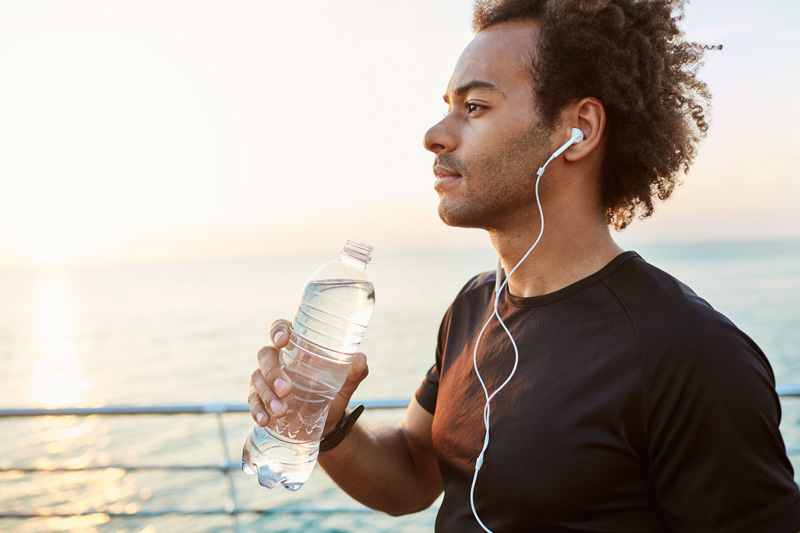
3. What Happens If You Dive Dehydrated?
Water is to the human body what oil is to a gasoline engine, allowing it to move more efficiently and without friction. However, if an engine loses its oil, it slows down and overheats until it breaks. We experience the same when we become dehydrated.
Dehydration is the result of an excessive loss of fluids in the body, which can lead to various health problems, including headaches, decreased physical and mental performance, irritability, confusion, fatigue, muscle cramps, problems with temperature regulation, decreased consciousness, and the risk of shock, among others. While these consequences can affect anyone, divers additionally have to consider the risk of suffering from Decompression Sickness (DS).
A dehydrated diver, besides experiencing reduced faculties, will also suffer a reduction in blood plasma, which is closely related to gas exchange. The slowed blood flow will delay the rate at which our body eliminates dissolved nitrogen due to pressure, and we know what happens when oxygen molecules remain in our system as we ascend, right?
4. How To Know If You Are Dehydrated?
In the world of diving, dehydration can be a silent enemy, lurking in the depths for underwater enthusiasts. Recognizing the signs of dehydration becomes a crucial skill to ensure safety and optimal performance beneath the surface.
How do you know if you’re dehydrated? Experts suggest paying attention to certain key indicators, with the color of urine being one of the clearest. “It should be transparent or slightly yellowish. A dark shade could be a sign of dehydration,” notes Dr. Garcia, specialized in hyperbaric medicine.
However, there are other subtle signs that could indicate a decrease in hydration levels. Dizziness, persistent headaches, muscle cramps, extreme fatigue, and an intense sensation of thirst or dryness in the mouth should be taken into account. “Often, thirst is a late indication that you are already dehydrated. Staying hydrated regularly is key,” warns Garcia.
Furthermore, a decrease in urine production, sunken eyes, or the inability to produce tears, as well as skin that takes time to regain its shape after being pressed, could indicate a severe lack of fluids in the body. Other concerning signs include a rapid heart rate, low blood pressure, and accelerated breathing, all of which suggest severe dehydration requiring immediate attention.
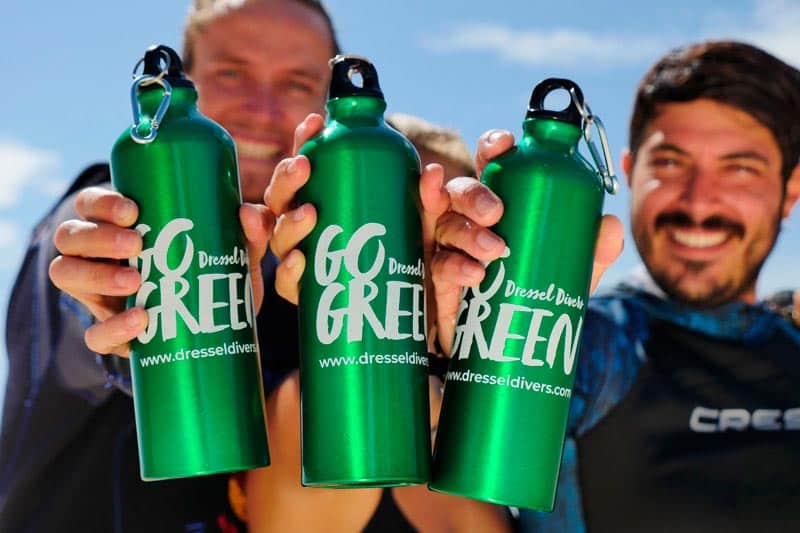
5. How Do Scuba Divers Stay Hydrated?
With the aim of safeguarding the integrity of divers, experts in the field from DAN recommend:
- putting on the wetsuit just before the dive;
- protecting oneself from the sun to prevent burns and avoiding prolonged exposure to it;
- rinsing the skin carefully to prevent water evaporation due to salt after diving;
- avoiding the consumption of high-salt foods, opting instead to add fruits and vegetables with high water content to the diet. These not only contribute to rehydration after diving but also provide essential nutrients for the body.
- Proper hydration, a crucial pillar in this equation, requires regular intake of water at strategic intervals, preferably a glass every 15-20 minutes. Specific hydration requirements vary depending on multiple factors; however, the importance of ingesting at least an additional 2 liters per day is emphasized.
- The crucial importance of hydration during dives doesn’t end with them. When considering the process of nitrogen elimination in our bodies after the activity, the need to maintain an adequate intake of fluids becomes evident.
6. What To Drink to Stay Hydrated During Diving?
In this context, experts emphatically warn against consuming stimulant beverages such as energy drinks, sodas, tea, or coffee before diving. Instead, they advocate for the consumption of pure water, which can, if desired, be enriched with small amounts of fruit juice or sports drinks with low sugar content.
While bottled water provides the right amount of water and mineral salts, sodas, on the other hand, contain an excess of sugars and gases that are not suitable for diving. Furthermore, these drinks can cause hyperglycemia, which hinders fluid absorption.
Consuming alcohol is even worse. We all know that alcoholic beverages dehydrate, not to mention the implicit risk of narcosis and the danger it poses to a diver.
Beverages with theine or caffeine have a diuretic effect, making them also unsuitable when the goal is to maintain hydration during diving.
Fortunately, all Dressel Divers diving boats carry water on board to meet the needs of divers who trust us.
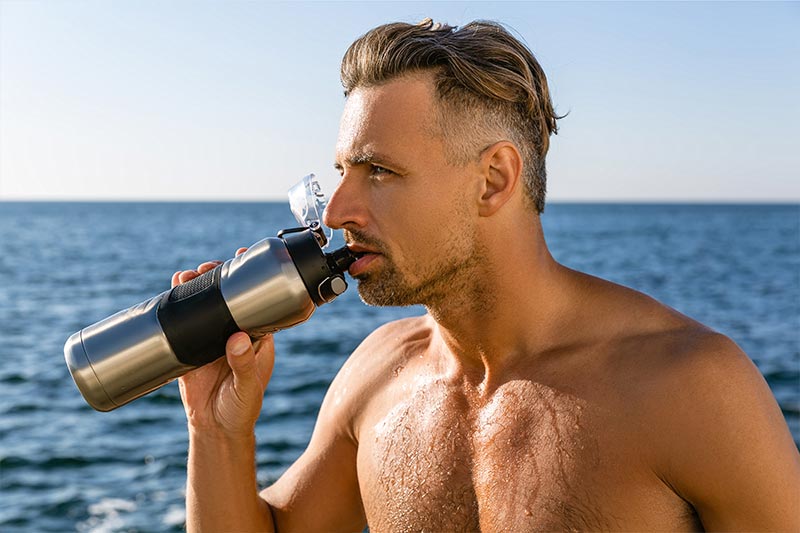
7. How Do You Drink Water While Diving?
During prolonged dives, it is necessary for technical divers to drink while underwater. How is this possible? Skilled divers have devised ingenious solutions to ensure a constant supply of fluids during their dives. Here are some of the standout strategies:
- SCUBA (Self-Contained Underwater Beverage Apparatus): With a modified tube and nozzle, it allows drinking without releasing the breathing regulator. It’s a useful but expensive tool that is hard to come by.
- Camelbak hydration systems are a popular choice among divers who prefer the sidemount configuration. However, carrying a water system on the back isn’t very practical when hauling a tank.
- Foldable water bags present another practical alternative. Although they require removing the regulator to drink, their flexible design allows for adaptability.
- Some dare to use bottles with straws, but the risk of consuming saltwater is very high.
In summary, maintaining proper hydration during diving not only enhances the diver’s performance and safety but also ensures a more comfortable and healthier underwater experience. By understanding the unique challenges posed by the aquatic environment, divers can adopt optimal hydration practices during diving to maximize their enjoyment and safety in the depths of the ocean.


